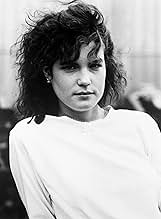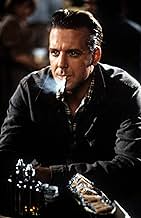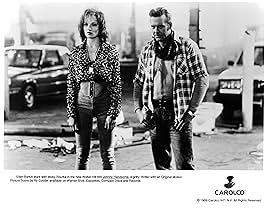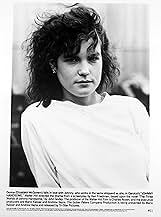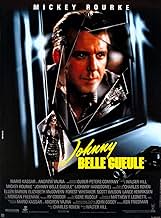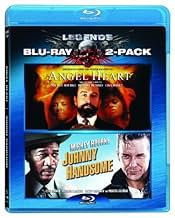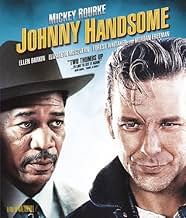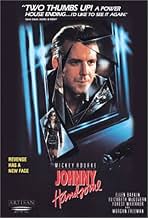AVALIAÇÃO DA IMDb
6,1/10
12 mil
SUA AVALIAÇÃO
Depois de ser traído e jogado na cadeia, um gângster deformado ganha um novo rosto e é reabilitado, mas seu desejo de vingança continua.Depois de ser traído e jogado na cadeia, um gângster deformado ganha um novo rosto e é reabilitado, mas seu desejo de vingança continua.Depois de ser traído e jogado na cadeia, um gângster deformado ganha um novo rosto e é reabilitado, mas seu desejo de vingança continua.
- Direção
- Roteiristas
- Artistas
- Prêmios
- 4 indicações no total
Jeffrey Meek
- Earl
- (as Jeff Meek)
John P. Fertitta
- Prestige Salesman
- (as John Fertitta)
Edward Walsh
- Judge
- (as Ed Walsh)
- Direção
- Roteiristas
- Elenco e equipe completos
- Produção, bilheteria e muito mais no IMDbPro
Avaliações em destaque
Mickey Rourke has to be one of the greatest, yet most under-rated,
American actors alive today. This film proves it. He plays this
character with layers and a depth few could accomplish or would
even dare. Unfortunately, most people regard his personal life
(and abrasive personality itself) with such disdain that they refuse
to fairly judge his professional accomplishments.
Rourke plays a grotesquely facially disfigured man who's life of
ridicule, non-existent home-life, and resultant self-guilt have led
him to a life of crime. Nothing original there, I'll admit. But one
must watch Rourke's subtle portrayal to see not a man of rage, as
most actors would give, and be expected of, from the audience, but
a man quietly locked into his world of pain. The way he holds his
cigarette from the top, so as to cover part of his face; the downward
tilt of his head, eyes averted from anyone's gaze; or the curt, quiet
speaking so as not to draw too much attention. The example of
speech is in itself remarkable. Not only does Rourke affect a
severe speech impediment as the disfigured Johnny Handsome,
but he then takes on a new one as a man who is now capable of
proper diction, but who is completely unused to being able to
speak properly. And he is constant in his portrayal throughout.
The story is simple but good, driven with excellent visual editing,
and a wonderful sound track (provided by Ry Cooder), that really
sets the pacing. The cast is largely wonderful, as well, with quite a
few recognizable "stars". Forest Whitaker as the sympathetic but
driven and demanding doctor, Lance Henrikson and Ellen Barkin
in amazing performances as two completely greedy "scum-bags",
and Morgan Freeman, in a real role reversal, as a rotten, taunting
parole officer. Probably the only weak link in the cast is Elizabeth
McGovern, who's attempted Louisiana accent never holds up and
over-all acting just suffices.
This film remains a favorite of mine that I watch every now and
again, always enjoying it both for the excitingly building tension of
the story, and the great performances (and performers) littered
throughout the film. If you like this film, I also suggest "The
Elephant Man", by David Lynch (for the life-with-disfigurement
aspects), or "The Warriors", by Walter Hill, as a great, early
example of this same director's work.
8/10 Mickey Rourke at his best!
American actors alive today. This film proves it. He plays this
character with layers and a depth few could accomplish or would
even dare. Unfortunately, most people regard his personal life
(and abrasive personality itself) with such disdain that they refuse
to fairly judge his professional accomplishments.
Rourke plays a grotesquely facially disfigured man who's life of
ridicule, non-existent home-life, and resultant self-guilt have led
him to a life of crime. Nothing original there, I'll admit. But one
must watch Rourke's subtle portrayal to see not a man of rage, as
most actors would give, and be expected of, from the audience, but
a man quietly locked into his world of pain. The way he holds his
cigarette from the top, so as to cover part of his face; the downward
tilt of his head, eyes averted from anyone's gaze; or the curt, quiet
speaking so as not to draw too much attention. The example of
speech is in itself remarkable. Not only does Rourke affect a
severe speech impediment as the disfigured Johnny Handsome,
but he then takes on a new one as a man who is now capable of
proper diction, but who is completely unused to being able to
speak properly. And he is constant in his portrayal throughout.
The story is simple but good, driven with excellent visual editing,
and a wonderful sound track (provided by Ry Cooder), that really
sets the pacing. The cast is largely wonderful, as well, with quite a
few recognizable "stars". Forest Whitaker as the sympathetic but
driven and demanding doctor, Lance Henrikson and Ellen Barkin
in amazing performances as two completely greedy "scum-bags",
and Morgan Freeman, in a real role reversal, as a rotten, taunting
parole officer. Probably the only weak link in the cast is Elizabeth
McGovern, who's attempted Louisiana accent never holds up and
over-all acting just suffices.
This film remains a favorite of mine that I watch every now and
again, always enjoying it both for the excitingly building tension of
the story, and the great performances (and performers) littered
throughout the film. If you like this film, I also suggest "The
Elephant Man", by David Lynch (for the life-with-disfigurement
aspects), or "The Warriors", by Walter Hill, as a great, early
example of this same director's work.
8/10 Mickey Rourke at his best!
This is a minor Walter Hill film, partly redeemed by a couple of strong performances and an excellent score. Mickey Rourke (whose last good film perhaps this is) plays John Sedley /Johnny Handsome' and labours for the first part of the film under make up presumably inspired by the Elephant Man - as well as a handicapping mumble, recalling the actor's idol Marlon Brando. Hill, one time Peckinpah protégé, has seen better days with such films as The Warriors, 48 Hours, Streets of Fire etc, and here struggles to make a rather bald plot dynamic. Essentially it's a tale of crime gone wrong, betrayal, brooding and then final revenge, enlivened with rather peremptory love interest. The surgery side of the story, in which Sedley is miraculously remade into handsome Mickey Rourke, is no more than a detour from an underworld tale we've all seen before.
Hill characteristically provides memorable opening sequences for his films. This strength is apparent here, as details of the cast appear over the preparation for the initial robbery, cut together effectively and precisely. The director fades the colour on these opening planning scenes, and later also includes a brief and horrific flashback in black and white. There are two robberies in the film, central points about which much of the drama revolves, carried off with some flair by the participants and the editing department. There's something of the flair of Hong Kong crime cinema as the masked villains burst into shops and offices to make their killing'. Elsewhere things flag a little - especially in the unconvincing Sunny Rafe relationship, played respectively by an aggressive Ellen Barkin and the normally excellent Lance Henriksen. Sadly the character and motivations of the chief villain remains one-dimensional, and Rafe's bare-armed menace never rises above stereotype.
Sedley struggles to first rebuild his face, then his life, while courting the rather insipid Donna (Elizabeth McGovern) and hatching his master plan. Although his motivation for revenge is clear, in between surgery and larceny he rather languishes. Donna is a `nice girl': either naïve or forgiving, however one choses to see her, whose role in the final denouement is also deemed `nice work'. This vaguely pejorative epithet, as well as her ill-judged covering up for a former boyfriend, provide her character's most defining moments. Her presence fails to give Sedley the impetus he needs, and her final abduction is sadly predictable. The attempt to work up another major character, this time through the doctor-with-a-social-conscience who treats Sedley (a peculiarly be-whiskered Forest Whitaker) is only partially successful. After a brief couple of confrontations with the implacable, and splendidly named, police Lieutenant A. Z. Drones (Morgan Freeman), he disappears. On the plus side, Rourke gives a generally good performance, being especially affecting in the scene when he examines his new face. Despite the limitations of the script, and even with the affected mumble, the actor avoids dropping into bathos in this critical scene, actually convincing the viewer of his pleasure in his new identity. His convincing gratitude to those who have changed his appearance pays dividends at the end of the film, during his confrontation with the vengeful Rafe. Rafe's pummeling of Sedley's face and vicious attack on his newly-constituted features with a knife is truly disturbing, precisely because Rourke has so successfully communicated the humanity behind the criminal and surgical subject earlier.
As Drones (whose dogged perseverance reminds one of Inspector Javert in Les Miserables), Freeman is excellent. An actor whose distinctive tones and modulated performances give class to any film, he raises his part far above the lines he is given here, and goes a way in making up for weaknesses elsewhere. During his few prison scenes with Rourke, in fact, one can shut one's eyes listen to his voice, and summon up the much greater pleasures of The Shawshank Redemption (1994). It is he who recognises the reality at the centre of the film: that Sedley can change his appearance, but can never change what is inside of himself or where it will lead: ` I know what you are' he says to the felon at one point. `And we both know where you're going, don't we Johnny?' At the close of the film, after bullets have flown and dust settled, Sedly finally acknowledges this fact using an ironic phrase which implies both physical and moral assessment : `How do I look?'.
Fans of Rourke and Freeman will certainly want to see this film, although others will find there is rather less to it than meets the eye. Ry Cooder, a regular collaborator with the director, turns in a superb score full of slide guitar work, with dramatic bass lines for the action sequences. This makes one regret that the final package to which he contributed so valiantly is ultimately so unmemorable. Admirers of Hill, wanting to see one of his late urban thrillers with more interest, will be better off with Trespass of three years later.
Hill characteristically provides memorable opening sequences for his films. This strength is apparent here, as details of the cast appear over the preparation for the initial robbery, cut together effectively and precisely. The director fades the colour on these opening planning scenes, and later also includes a brief and horrific flashback in black and white. There are two robberies in the film, central points about which much of the drama revolves, carried off with some flair by the participants and the editing department. There's something of the flair of Hong Kong crime cinema as the masked villains burst into shops and offices to make their killing'. Elsewhere things flag a little - especially in the unconvincing Sunny Rafe relationship, played respectively by an aggressive Ellen Barkin and the normally excellent Lance Henriksen. Sadly the character and motivations of the chief villain remains one-dimensional, and Rafe's bare-armed menace never rises above stereotype.
Sedley struggles to first rebuild his face, then his life, while courting the rather insipid Donna (Elizabeth McGovern) and hatching his master plan. Although his motivation for revenge is clear, in between surgery and larceny he rather languishes. Donna is a `nice girl': either naïve or forgiving, however one choses to see her, whose role in the final denouement is also deemed `nice work'. This vaguely pejorative epithet, as well as her ill-judged covering up for a former boyfriend, provide her character's most defining moments. Her presence fails to give Sedley the impetus he needs, and her final abduction is sadly predictable. The attempt to work up another major character, this time through the doctor-with-a-social-conscience who treats Sedley (a peculiarly be-whiskered Forest Whitaker) is only partially successful. After a brief couple of confrontations with the implacable, and splendidly named, police Lieutenant A. Z. Drones (Morgan Freeman), he disappears. On the plus side, Rourke gives a generally good performance, being especially affecting in the scene when he examines his new face. Despite the limitations of the script, and even with the affected mumble, the actor avoids dropping into bathos in this critical scene, actually convincing the viewer of his pleasure in his new identity. His convincing gratitude to those who have changed his appearance pays dividends at the end of the film, during his confrontation with the vengeful Rafe. Rafe's pummeling of Sedley's face and vicious attack on his newly-constituted features with a knife is truly disturbing, precisely because Rourke has so successfully communicated the humanity behind the criminal and surgical subject earlier.
As Drones (whose dogged perseverance reminds one of Inspector Javert in Les Miserables), Freeman is excellent. An actor whose distinctive tones and modulated performances give class to any film, he raises his part far above the lines he is given here, and goes a way in making up for weaknesses elsewhere. During his few prison scenes with Rourke, in fact, one can shut one's eyes listen to his voice, and summon up the much greater pleasures of The Shawshank Redemption (1994). It is he who recognises the reality at the centre of the film: that Sedley can change his appearance, but can never change what is inside of himself or where it will lead: ` I know what you are' he says to the felon at one point. `And we both know where you're going, don't we Johnny?' At the close of the film, after bullets have flown and dust settled, Sedly finally acknowledges this fact using an ironic phrase which implies both physical and moral assessment : `How do I look?'.
Fans of Rourke and Freeman will certainly want to see this film, although others will find there is rather less to it than meets the eye. Ry Cooder, a regular collaborator with the director, turns in a superb score full of slide guitar work, with dramatic bass lines for the action sequences. This makes one regret that the final package to which he contributed so valiantly is ultimately so unmemorable. Admirers of Hill, wanting to see one of his late urban thrillers with more interest, will be better off with Trespass of three years later.
Johnny Handsome is directed by Walter Hill and adapted to screenplay by Ken Friedman from the novel "The Three Worlds of Johnny Handsome" written by John Godey. It stars Mickey Rourke, Ellen Barkin, Elizabeth McGovern, Lance Henriksen, Forest Whitaker, Morgan Freeman and Scott Wilson. Music is by Ry Cooder and cinematography by Matthew F. Leonetti.
John Sedley (Rourke), AKA: Johnny Handsome, has a severely disfigured face, when he and his only real friend are double-crossed by two accomplices during a robbery, Johnny is sent to prison and his life reaches a new low. However, hope springs in the form of Dr. Steven Fisher (Whitaker), a pioneering plastic surgeon who offers to give Johnny surgery that would give him a normal face as he attempts to integrate back into society. With a new face making him unrecognisable, there is scope to enact revenge on the two people who killed his best friend and had him put in prison...
Walter Hill knows his film noir, anyone who has seen The Driver knows this. Here for Johnny Handsome, Hill takes a lot of the fantastical elements of noir and dresses it up admirably as a violent revenge thriller. A box office flop and something of a kicking post for big hitting critics of the late 1980s, it's a film that now can be seen as being very much in tune with its influences.
The charges of it being too bonkers, too violent and too much of a "B" movie homage just don't add up, because what is on offer is good solid meaty neo-noir cinema. A protagonist with an affliction, medical shenanigans, hyper femme fatale, over the top villain and a stoic and sarcastic gumshoe type copper. All of which operate in a sweaty and luridly coloured New Orleans. Add in Hill's eye for aggressive action sequences and it's neo a go-go.
Hill gets strong performances from his cast, ensuring emotional bonds are not over egged and a clamour for sympathy and understanding kept to a bearable level by the actors playing the "good" guys "n" dolls. While giving Henriksen and Barkin licence to sizzle with sinister glee is astute and perfectly in tune with the material on the page. Leonetti's photography has the requisite pulpy noirishness to it, and the familiar twangs of Ry Cooder are never a bad thing in a Walter Hill movie.
It's not perfect by any stretch of the imagination, but those complaining about missed opportunities regarding rehabilitation - or that the liberal doctor turns out to be clinically wrong in his reform beliefs - really are missing the point or unaware of the world where something like Johnny Handsome lives. From the kinetic misery at film's start, to the "ever so in tune with film noir" finale, Johnny Handsome is well worth a look by anyone interested in noir's updated version. 7/10
John Sedley (Rourke), AKA: Johnny Handsome, has a severely disfigured face, when he and his only real friend are double-crossed by two accomplices during a robbery, Johnny is sent to prison and his life reaches a new low. However, hope springs in the form of Dr. Steven Fisher (Whitaker), a pioneering plastic surgeon who offers to give Johnny surgery that would give him a normal face as he attempts to integrate back into society. With a new face making him unrecognisable, there is scope to enact revenge on the two people who killed his best friend and had him put in prison...
Walter Hill knows his film noir, anyone who has seen The Driver knows this. Here for Johnny Handsome, Hill takes a lot of the fantastical elements of noir and dresses it up admirably as a violent revenge thriller. A box office flop and something of a kicking post for big hitting critics of the late 1980s, it's a film that now can be seen as being very much in tune with its influences.
The charges of it being too bonkers, too violent and too much of a "B" movie homage just don't add up, because what is on offer is good solid meaty neo-noir cinema. A protagonist with an affliction, medical shenanigans, hyper femme fatale, over the top villain and a stoic and sarcastic gumshoe type copper. All of which operate in a sweaty and luridly coloured New Orleans. Add in Hill's eye for aggressive action sequences and it's neo a go-go.
Hill gets strong performances from his cast, ensuring emotional bonds are not over egged and a clamour for sympathy and understanding kept to a bearable level by the actors playing the "good" guys "n" dolls. While giving Henriksen and Barkin licence to sizzle with sinister glee is astute and perfectly in tune with the material on the page. Leonetti's photography has the requisite pulpy noirishness to it, and the familiar twangs of Ry Cooder are never a bad thing in a Walter Hill movie.
It's not perfect by any stretch of the imagination, but those complaining about missed opportunities regarding rehabilitation - or that the liberal doctor turns out to be clinically wrong in his reform beliefs - really are missing the point or unaware of the world where something like Johnny Handsome lives. From the kinetic misery at film's start, to the "ever so in tune with film noir" finale, Johnny Handsome is well worth a look by anyone interested in noir's updated version. 7/10
I pondered why Mickey agreed to do this movie. To work with the respected Walter Hill? Or because of the sincerity he saw in portraying a man resurrected? He plays his character with conviction, yet you know Handsome is emotionally wounded, a quality hard to project. You will be impressed by the film's monumental scene where Forest Whitaker reveals Handsome's new face, in turn revealing the jubilation he certainly has dreamt about his whole life. I believe that scene to be hallmark Mickey, very hard to mimic. He handles the role with a sensitivity you can believe about a man in his predicament. A good reason why casting is vital to a clichéd story! Walter Hill directs Mickey to his fullest. I also thought Liz McGovern to be a good choice as a clinging, excessive optimist with a heart for bad boys. It's a suitable choice that she's not lustfully beautiful- a regular, dull, secretarial girl puts the attention on Rourke, which would have detracted from the real element of the storyline had they cast a perfect 10. Freeman functions as a foil to the story and with a vintage performance of his obvious range.
Mickey Rourke gives an astonishing performance as John Sedley a deformed thug who gets a chance at a normal life when a kind Doctor (Forrest Whitaker) asks to do plastic surgery on Sedley. Sedley accepts and is torn between going straight or getting revenge on the two(Lance Henriksen and Ellen Barkin) that killed his friend Mikey (Scott Wilson)in this compelling yet slightly long drama. Some very exciting actionscenes and a good ear for dialog make Johnny Handsome stand out from other revenge flicks in the genre.
Você sabia?
- CuriosidadesAl Pacino was initially interested in playing the title character, and worked with the producers on developing the script, but ultimately dropped out of the project, due to script problems. Pacino felt, despite numerous revisions, they had never been able to transcend the script's B-movie qualities.
- Erros de gravaçãoDuring the graveyard scene, Larry "pumps" the action on a double barreled shotgun.
- Citações
Vic Dumask: I don't know you, Mr. Mitchell. What can I do for you?
John 'Johnny Handsome' Sedley: A laundry service. Could be five million dollars worth.
Vic Dumask: That sounds illegal.
John 'Johnny Handsome' Sedley: [sotto voce] It is.
Principais escolhas
Faça login para avaliar e ver a lista de recomendações personalizadas
- How long is Johnny Handsome?Fornecido pela Alexa
Detalhes
- Data de lançamento
- País de origem
- Idioma
- Também conhecido como
- Johnny Handsome
- Locações de filme
- Empresas de produção
- Consulte mais créditos da empresa na IMDbPro
Bilheteria
- Orçamento
- US$ 20.000.000 (estimativa)
- Faturamento bruto nos EUA e Canadá
- US$ 7.237.794
- Fim de semana de estreia nos EUA e Canadá
- US$ 2.437.642
- 1 de out. de 1989
- Faturamento bruto mundial
- US$ 7.237.794
- Tempo de duração1 hora 34 minutos
- Cor
- Mixagem de som
- Proporção
- 1.85 : 1
Contribua para esta página
Sugerir uma alteração ou adicionar conteúdo ausente




